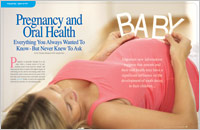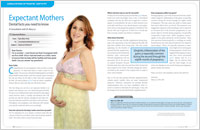 Your baby's teeth will not be visible at birth. But believe it or not, they already exist beneath the gums. Children's primary teeth begin forming at about the sixth week of pregnancy, and start mineralizing — building the bonelike inner tooth layer (called dentin) and the super-hard enamel layer that covers it — around the third or fourth month of pregnancy. So if you're pregnant, it's not too early to start thinking about how to make sure your child's teeth are as healthy as possible!
Your baby's teeth will not be visible at birth. But believe it or not, they already exist beneath the gums. Children's primary teeth begin forming at about the sixth week of pregnancy, and start mineralizing — building the bonelike inner tooth layer (called dentin) and the super-hard enamel layer that covers it — around the third or fourth month of pregnancy. So if you're pregnant, it's not too early to start thinking about how to make sure your child's teeth are as healthy as possible!
Like everything else having to do with your baby's physical development before birth, much depends on how well you take care of yourself. Developing teeth need certain nutrients to grow properly; if you don't get them through your diet, your baby won't receive them either. Likewise, you'll have to watch your intake of substances that could harm your teeth in utero, such as certain antibiotics. Here's a brief summary of what to seek and what to avoid.
Eat Right
Certain nutrients are particularly important for prenatal tooth development:
- Calcium , a mineral, is the main component of teeth. If there is not enough calcium coming from your diet to support fetal development, your body will actually take this mineral from your bones (but not your teeth) and use it to meet your developing baby's needs. Good for your baby, not so good for you. The best sources of dietary calcium are dairy foods such as milk, cheese and yogurt. It can also be found in broccoli and kale.
- Phosphorous , another mineral, also accounts for the hardness of teeth. It is found in every one of the body's cells, and also in many foods — especially high protein sources such as meat and milk, but also cereals. Of all the nutrients your baby's teeth need, this is the easiest to get.
- Vitamin D helps the body absorb and retain calcium and phosphorous. Very few foods contain it naturally — oily fish like salmon and tuna are exceptions; that's why it is added to milk and some other beverages and foods (check labels to find out which ones). It is also produced in the body naturally when skin is directly exposed to sunlight. Concerns about the negative effects of sun exposure may prevent you from getting all the vitamin D your body requires this way, so you may be advised to take a supplement.
- Protein is the most plentiful substance in your body after water. It is responsible for building, maintaining and replacing the body's tissues. Interestingly, it is the action of a single protein that causes calcium-phosphate crystals to form tooth enamel rather than bone. All proteins are made of amino acids, but some amino acids cannot be manufactured by the body and must come from foods. Meats and dairy products are the most protein-rich. It is possible to get all the different proteins your body requires with a vegetarian diet, but you will need to pay closer attention to what combinations of foods will provide all the essential amino acids.
Seek Guidance on Dietary Supplementation & Medications
If you feel your diet is inadequate in some nutrients during your pregnancy, it's best to seek professional medical advice on what supplements you may need. While it's unlikely you will ever receive too much of any given nutrient from your diet, you can overdo certain vitamins and minerals in pill form (vitamin D and calcium, for example).
When you know you're pregnant (or if you may be pregnant), please share the news with all of your healthcare professionals who see you. That way, medications that should not be prescribed will be avoided at this time. For example, if you need antibiotics to combat an infection, some are much safer for developing babies than others. Tetracycline, for example, can permanently stain teeth in utero. Fluoride supplementation at this time is not recommended either, as there are too many unanswered questions about its use during pregnancy.
Related Articles

Pregnancy & Oral Health Pregnancy is generally thought of as the time when a woman strives to be particularly aware of the need for “health.” Many women though may not be aware of the link that exists between their oral health and their systemic (general) health, as well as the impact that many other factors can have on a developing child. Learn about how to care for yourself and your baby... Read Article

Pregnancy & Birth Control Pregnant women or those taking birth control pills can become prone to gum disease — a bacterial infection caused by a buildup of dental plaque. That's because in both cases, the elevation of certain hormones causes blood vessel changes in the gums, making them more susceptible to the effects of bacteria... Read Article

Expectant Mothers As an expectant mother, you know you need to take special care of yourself. But did you know this extra TLC extends to oral hygiene? Pregnancy hormones can make a woman more prone to gum disease and other oral health problems. Find what you can do to safeguard yourself and your baby... Read Article
